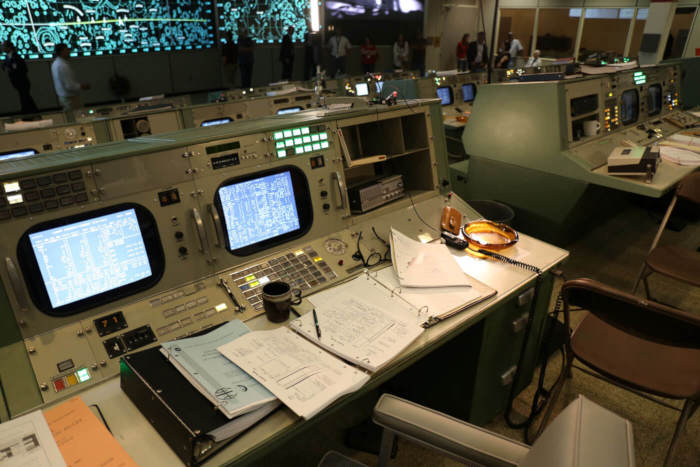chasing the eureka.
sunday, june 9th, 2024.

I've recently been down the Wikipedia rabbit hole about the Apollo Guidance Computer and generally the entirety of the space race. One of my mentor system engineers liked to say of earlier engineers: "man, those old dudes were smart!" And a similar expression I've heard showing deference to our predecessors: "my dad gets smarter the older I get."
I am fortunate to be gainfully employed as an embedded software engineer— my specialty is digging in the guts of chip data sheets and trying to wrestle with various operating systems and baremetal applications to get things up and running. More often than not, this is a long, arduous process of trial-and-error until it finally works, at which point I wrap up the whole enchilada, commit it to git, and move on to the next frustration.
When I'm in the throes of getting some of this low-level stuff working, I'm often surrounded by printouts, not unlike the desk at Mission Control in the picture above. And it is precisely in those "eureka!" moments, surrounded by margin scribbles and highlighted bits, that I feel the distance between "that-which-I-imagine-myself-to-be" and "that-which-I-am" finally close.
Sometimes the frustration gets the better of me, and the undiagnosed ADHD in me wants, desperately, to fuck off and get nothing done. I try this, that, and the other and my efforts find no purchase in the sheer cliff of hardware bring-up. And, alas— it is in these moments that I know imposter syndrome most deeply. I step away from the work, then feel anxious that the work should have been completed already if it weren't for this setback. My gaze lowers to my shoes in the hallways of my peers and I fear the inevitable status update that proffers no news.
But, the breakthroughs eventually come.
It is the tenacity of beating my head on the wall until the wall gives that sees me through the other side. And— my god!— does it ever feel gratifying to shout to my team: "I've figured it out!" The long gap of imposter syndrome closes and I feel closest to the brilliant engineers that came before me.
I am 40 years old and I can feel the march of time. I am no longer a young man— I am now a mentor. I am more comfortable in the uncertainty than I've ever been and know to trust the process. I've seen the follies from the perspective of having lived them.
At some point, after I have departed from this mortal coil (hopefully at the ripe old age of 90 or so), someone may come across my journals and writing and find them a mild curiosity. I have no illusions of Margaret Hamilton-level grandeur, but I do hope that someone in the line of engineers that follow will find pause in some of my work, think to themselves: "man, those old dudes were smart," and realize that they, too, are part of a long line of thinkers that stretches from the beginning of humanity to its end.
Ha! That's quite enough pontification for a Sunday evening!
Until next time, be well. :)